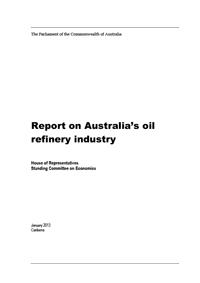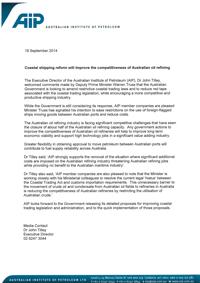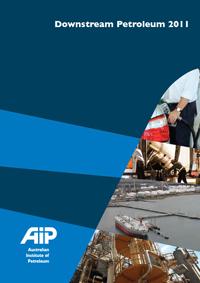Resources

Date
Description
On 5 February 2013 the House of Representatives Standing Committee on Economics tabled its Report on 'Australia's Oil Refinery Industry', following the Committee's inquiry in 2012. The Inquiry was conducted in relation to claims and concerns being raised about the viability of Australia's oil…Date
Description
All fuel users need to analyse and understand their own fuel use and to consider how best to manage the potential impacts of reduced fuel supply Many larger fuel users only hold limited stocks on the expectation that stocks will be held by fuel suppliers, or indeed governments will intervene…Date
Description
Australia has robust emergency response plans and arrangements Industry and governments fully recognise the potential impacts of a severe national shortage of fuel supplies to business and consumers. Australia has robust response plans for managing a national liquid fuel emergency, which…Date
Description
Self-sufficiency in transport fuels is not necessary for supply security Security of supply is the result of resilient and efficient supply chains and robust risk management – it is not about self-sufficiency or independence from markets. There are 3 critical elements of any strategy to…Date
Description
Subsidising domestic alternative fuel production is not necessary for energy security The reliable supply of conventional transport fuels (petrol, diesel and jet fuel) to the Australian market is underpinned by a diversity of supply options for petroleum products from domestic refiners and…Date
Description
Australia’s import, terminal and storage capacity for transport fuel has increased over time to meet growth in fuel demand There has been significant investment in new and expanded storage and terminal facilities over recent years to meet demand growth in key regional centres, as evidenced in…Date
Description
Relying on shipping (for imports) does not increase security risks, and shipping lanes are not easily disrupted. Most countries are reliant on movements of petroleum (crude and product) within and between countries, and particularly so for Australia (in both an export and import sense).…Date
Description
Australian refineries continue to operate with no indications of any plans to close the remaining four There have been statements and Inquiry submissions from all refining companies about their future refinery investment plans and the ongoing role of these facilities in meeting customer…
Date
Description
The Executive Director of the Australian Institute of Petroleum (AlP), Dr John Tilley, welcomed comments made by Deputy Prime Minister Warren Truss that the Australian Government is looking to amend restrictive coastal trading laws and to reduce red tape associated with the coastal trading…
Date
Description
The Australian Institute of Petroleum (AIP) today released 'Downstream Petroleum 2011', the new edition of AIP's biennial publication on the state of the Australian downstream petroleum industry and its financial performance. This latest report provides a concise overview of recent developments…